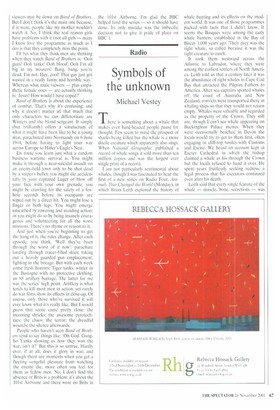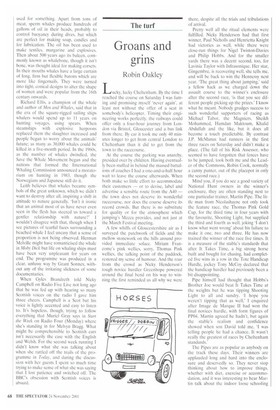Symbols of the unknown
Michael Vestey
There is something about a whale that makes even hard-headed people pause for thought. Few seem to mind the prospect of sharks being killed but the whale is a more docile creature which apparently also sings. When National Geographic published a record of whale songs it sold more than ten million copies and was the largest ever single print of a record.
I am not particularly sentimental about whales, though I was fascinated to hear the first of a new series on Radio Four, Animals That Changed the World (Monday), in which Brian Leith explored the history of
whale hunting and its effects on the modern world. It was one of those programmes packed with facts that I didn't know. It seems the Basques were among the early whale hunters, established in the Bay of Biscay 1,000 years ago. Their prey was the right whale, so called because it was the right creature to catch.
It took them westward across the Atlantic to Labrador, where they were among the earliest settlers of North America. Leith told us that a century later it was the abundance of right whales in Cape Cod Bay that attracted the Pilgrim Fathers to America. After sea captains spotted whales off the coast of Australia and New Zealand, convicts were transported there in whaling ships so that they would not return empty. Whales were valuable and regarded as the property of the Crown. They still are, though I can't see whale appearing on Buckingham Palace menus. When they were occasionally beached in Devon the locals would try to get to them first, often engaging in cliff-top tussles with Customs and Excise. We heard an account kept at Exeter Cathedral in which the bishop claimed a whale as his through the Crown but the locals refused to hand it over. He spent years fruitlessly seeking redress, a legal process that his executors continued even after his death.
Leith said that every single feature of the whale — muscle, bone, secretions — was used for something. Apart from tons of meat, sperm whales produce hundreds of gallons of oil in their heads, probably to control buoyancy during dives, but which are perfect for making soap, candles and for lubrication. The oil has been used to make textiles, margarine and explosives. Then about 500 years ago its baleen, commonly known as whalebone, though it isn't bone, was thought ideal for making corsets. In their mouths whales have a large curtain of long, firm but flexible batons which are more like fingernails. They were turned into tight, conical designs to alter the shape of women and were popular from the 16th century onwards.
Richard Ellis, a champion of the whale and author of Men and Whales, said that in the era of the square-rigged sailing ships whalers would spend up to 11 years on hunting voyages, using spears. When steamships with explosive harpoons replaced them the slaughter increased and people began to worry about the animals' future: as many as 30,000 whales could be killed in a five-month period. In the 1960s, as the number of whales dwindled, the Save the Whale Movement began and the nations that formed the International Whaling Commission announced a moratorium on hunting in 1983, though the Norwegians and Japanese still do it.
Leith believes that whales became symbols of the great unknown, which we didn't want to destroy after all, inspiring a shift in attitude to nature generally. 'Isn't it ironic that an animal most of us have never even seen in the flesh has steered us toward a gentler relationship with nature?' I wouldn't disagree with that, though when I see pictures of tearful faces surrounding a beached whale I feel uneasy that a sense of proportion is not being observed, Herman Melville might have romanticised the whale in Moby Dick but life on whaling ships must have been very unpleasant for years on end. The programme was produced in a clear, unfussy way by Grant Sonnex, without any of the irritating slickness of some documentaries.
When Gyles Brandreth told Nicky Campbell on Radio Five Live not long ago that he was fed .up with hearing so many Scottish voices on the radio I gave him three cheers. Campbell is a Scot but his voice is lightly accented and easy to listen to. It's hopeless, though, trying to follov, everything that Muriel Gray says in Start the Week on Radio Four (Monday) where she's standing in for Melvyn Bragg. What might be comprehensible to Scottish ears isn't necessarily the case with the English and Welsh. For the second week running I didn't know what she was talking about when she rattled off the trails of the programme in Today, and during the discussion with her guests I spent so much time trying to make sense of what she was saying that I lost patience and switched off. The BBC's obsession with Scottish voices is absurd.



















































































 Previous page
Previous page